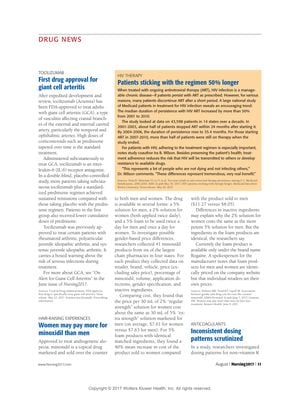Drug News
July 2017
in “
Nursing2023
”

TLDR Actemra is approved for a specific artery condition, HIV treatment adherence has improved, women may pay more for a hair loss product, and incorrect dosing of blood thinners can be risky.
In 2017, tocilizumab (Actemra) was FDA-approved for the treatment of giant cell arteritis (GCA), marking the first drug specifically approved for this condition. It is an interleukin-6 (IL-6) receptor antagonist administered subcutaneously and has shown to be more effective in achieving sustained remission and requiring lower cumulative doses of prednisone compared to the standard prednisone regimen alone. Additionally, a study involving 43,598 Medicaid patients over a decade showed that the median duration of persistence with HIV antiretroviral therapy (ART) increased by over 50% from 2001 to 2010, indicating improved patient adherence to treatment. Furthermore, research on minoxidil, a drug approved for androgenetic alopecia, revealed potential gender-based price discrepancies, with women paying approximately 40% more for the 5% foam product compared to men, despite identical ingredients. Lastly, a study of 14,865 patients with atrial fibrillation (AF) treated with non-vitamin K antagonist oral anticoagulants (NOACs) found that inconsistent dosing patterns often did not align with drug labeling and could be associated with increased risk of major bleeding when overdosed and increased risk of stroke when underdosed.





